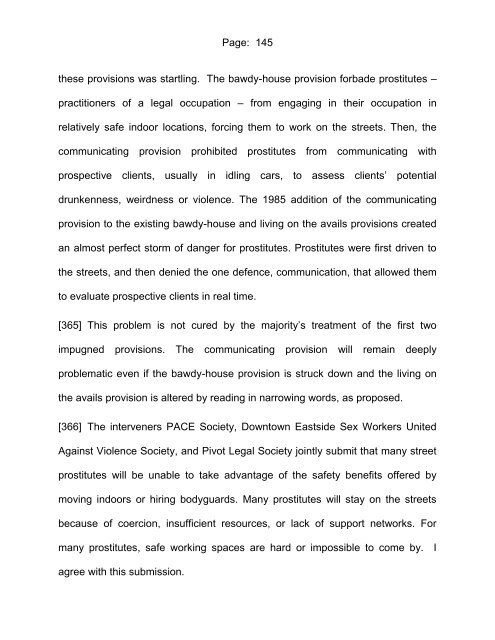Canada (Attorney General) v. Bedford, 2012 ONCA ... - York University
Canada (Attorney General) v. Bedford, 2012 ONCA ... - York University
Canada (Attorney General) v. Bedford, 2012 ONCA ... - York University
You also want an ePaper? Increase the reach of your titles
YUMPU automatically turns print PDFs into web optimized ePapers that Google loves.
Page: 145these provisions was startling. The bawdy-house provision forbade prostitutes –practitioners of a legal occupation – from engaging in their occupation inrelatively safe indoor locations, forcing them to work on the streets. Then, thecommunicating provision prohibited prostitutes from communicating withprospective clients, usually in idling cars, to assess clients‟ potentialdrunkenness, weirdness or violence. The 1985 addition of the communicatingprovision to the existing bawdy-house and living on the avails provisions createdan almost perfect storm of danger for prostitutes. Prostitutes were first driven tothe streets, and then denied the one defence, communication, that allowed themto evaluate prospective clients in real time.[365] This problem is not cured by the majority‟s treatment of the first twoimpugned provisions. The communicating provision will remain deeplyproblematic even if the bawdy-house provision is struck down and the living onthe avails provision is altered by reading in narrowing words, as proposed.[366] The interveners PACE Society, Downtown Eastside Sex Workers UnitedAgainst Violence Society, and Pivot Legal Society jointly submit that many streetprostitutes will be unable to take advantage of the safety benefits offered bymoving indoors or hiring bodyguards. Many prostitutes will stay on the streetsbecause of coercion, insufficient resources, or lack of support networks. Formany prostitutes, safe working spaces are hard or impossible to come by. Iagree with this submission.
















